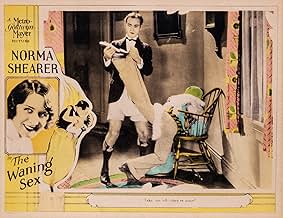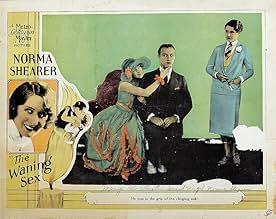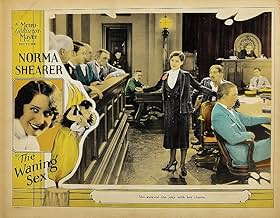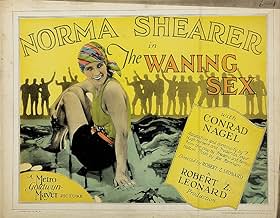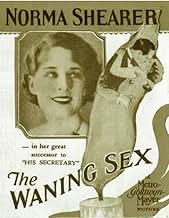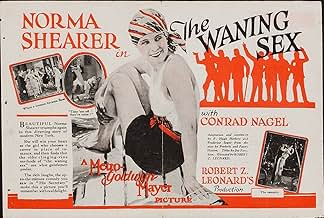Füge eine Handlung in deiner Sprache hinzuNina Duane (Norma Shearer) is a criminal lawyer whose gender is professionally resented by Philip Barry (Conrad Nagel), the District Attorney. She wins acquittal for man-chasing widow Mary B... Alles lesenNina Duane (Norma Shearer) is a criminal lawyer whose gender is professionally resented by Philip Barry (Conrad Nagel), the District Attorney. She wins acquittal for man-chasing widow Mary Booth (Mary McAllister), then defeats her in romancing the D.A.Nina Duane (Norma Shearer) is a criminal lawyer whose gender is professionally resented by Philip Barry (Conrad Nagel), the District Attorney. She wins acquittal for man-chasing widow Mary Booth (Mary McAllister), then defeats her in romancing the D.A.
Empfohlene Bewertungen
Norma Shearer plays Nina Duane, a defense attorney. Conrad Nagel plays district attorney Philip Barry. Apparently their romance has been going on for some time, and Barry wants a traditional marriage, so that means Nina would have to quit her job. She proposes three tests. Whoever wins two out of three dictates marriage terms. The first test is a swimming contest, and Barry wins that one.
The second one takes up lots of screen time and is odd and funny. It's about some brutish looking guy, accused of a crime never mentioned. His associates want Nina to be the defense attorney. She accepts and also makes it the second test - her as defense attorney against Barry as DA. It is the oddest trial I've ever seen. At no point does either of them ever state facts, nor are there any witnesses. They just humorously pontificate. The defendant looks like somebody I'd cross the street to avoid, he is such a rough looking character. There is also a funny scene of Nagel and Shearer stacking things on Lady Justice's scales to signify their contest. This time the contest goes to Shearer.
So we are down to one contest. On Shearer's side - the progressive party, due to her high profile win against Barry, wants her to run against him for the office of District Attorney. On Nagel's side - there is a beautiful flirty black widow who wants him to be her third late husband. This film is very cute and amusing and I'm surprised I've never heard of it before.
Maybe part of it is lost. The print I saw ran at exactly an hour. There is just a still of the MGM lion at the beginning, and new frames have been inserted for the credits. I think that the title cards are newly printed too. Someone else mentioned that the music did not to fit the mood for the film, but I thought it worked well. By the way, the title cards are quite verbose. Maybe Dorothy Arzner could have done more with it, but considering it was such light-hearted fare I think Robert Z. Leonard was more than adequate as director. Cedric Gibbons did the art design, and he showed his expected attention to detail.
Recommended for silent fans. Though an MGM property, I'm not expecting this to show up on Turner Classic Movies restored and with a new score anytime soon, although that would be a treat.
In her first scene, Norma Shearer is gorgeous, with shorter hair than she would wear in her better known 30s pre-codes. Also, this is a proto-feminist comedy, rather than the dramas I'm used to seeing Norma in. Norma is a lawyer and Conrad Nagel is the district attorney. He loves her and wants her to give up her career and marry him. She proposes a contest of three events and best two out of three sets the marriage terms.
Conrad Nagel as a leading man left a lot to be desired in my book ... rather bland looking and in this film a bit of a wimp, totally overshadowed by Norma's dedicated career woman. Nagel certainly had a successful career, particularly in the silent era as leading man to such glamorous women as Gloria Swanson (The Impossible Mrs. Bellow, 1922), Leatrice Joy (De Mille's Saturday Night, 1922), Bebe Daniels (Nice People, Singed Wings, both 1922), Pola Negri (Bella Donna, 1923), Aileen Pringle (Elinor Glynn's notorious Three Weeks, 1923), Marion Davies (Lights of Old Broadway, 1925), Dolores Costello (Glorious Betsy, Tenderloin, both 1928), and Garbo (The Mysterious Lady, 1928; The Kiss, 1929). He easily survived the transition to sound but his career faded as the decade progressed.
Back to the film, Norma next appeared in a bathing suit modeled after those worn by men in the 20s, bike shorts-like bottoms with a muscle shirt top, that Norma adds a matching headscarf to cover her hair. Very attractive and it underscores Norma's gentleman-like character. In addition, Norma performs on-camera one of her favorite party tricks in real life-diving into a pool from a standing on her head postion on the diving board. Impressive! The first contest is a swimming race, which Nagel wins.
The second contest is a trial with the lovebirds on opposite sides. There's one of those symbolic scenes that periodically turn up in 20s films ... this time Norma and Conrad trying to tip an enormous statue of the scales of justice in their own favor, symbolizing the trial to come.
Speaking of the trial, Norma verbally skewers Conrad while dressed in a mannish black suit with a skirt, featuring a white shirt, bow tie and a jaunty white carnations in her buttonhole. Norma isn't above using her feminine wiles to sway the jury to the side of her client. Norma handily wins the second contest.
Next we see Norma at her most feminine, brushing her longer, loose hair; dressed in satin evening pajamas and a striped robe before she changes into a stunning white beaded & fringed cocktail dress. A political group shows up at her home and wants her to run against Nagel for district attorney. This almost becomes the third challenge in the marriage contest but after some good natured back and forth, Nagel declares they will get married and be equal partners.
THE WANING SEX is less a battle of the sexes and more a detailed plan on how a weak man can nab a strong, confident woman. It's easy to see why Norma was one of the top MGM stars of the twenties, she's gorgeous and capable in every way scene. The print I saw on YouTube was very washed out, but at least it had a piano score, rather than an organ. It's not a big, important picture, more of a standard romantic comedy meant to be enjoyed and forgotten. It's worth a look.
About ten minutes of this movie is missing from the print I saw, and I thought the accompaniment I heard did not match the essentially light-hearted feminist story, which has Miss Shearer wearing pants in one scene and a very attractive evening gown in another. It's clearly a vehicle to show off Miss Shearer, with a few good poses thrown in for Nagel under the typically competent direction of Robert Z. Leonard, but it's clear that something is missing from the shortened print; it ends fairly abruptly. Still, there are some nice small parts for George K. Arthur and Tiny Ward, and typically stylish art design by Cedric Gibbons.
Wusstest du schon
- PatzerWhen Norma Shearer's character is shown the (reconstructed) newspaper headline insert about the court case, it states Conrad Nagel's character Philip Barry as defence attorney rather than prosecuting District Attorney.
- Zitate
Nina Duane: Perfect! This can be the first of our tests.
- VerbindungenReferenced in Hollywood Hist-o-Rama: Norma Shearer (1962)
Top-Auswahl
Details
- Erscheinungsdatum
- Herkunftsland
- Sprachen
- Auch bekannt als
- Sexo Fraco
- Drehorte
- Produktionsfirma
- Weitere beteiligte Unternehmen bei IMDbPro anzeigen
Box Office
- Bruttoertrag in den USA und Kanada
- 251.663 $
- Laufzeit1 Stunde 10 Minuten
- Farbe
- Sound-Mix
- Seitenverhältnis
- 1.33 : 1
Zu dieser Seite beitragen


